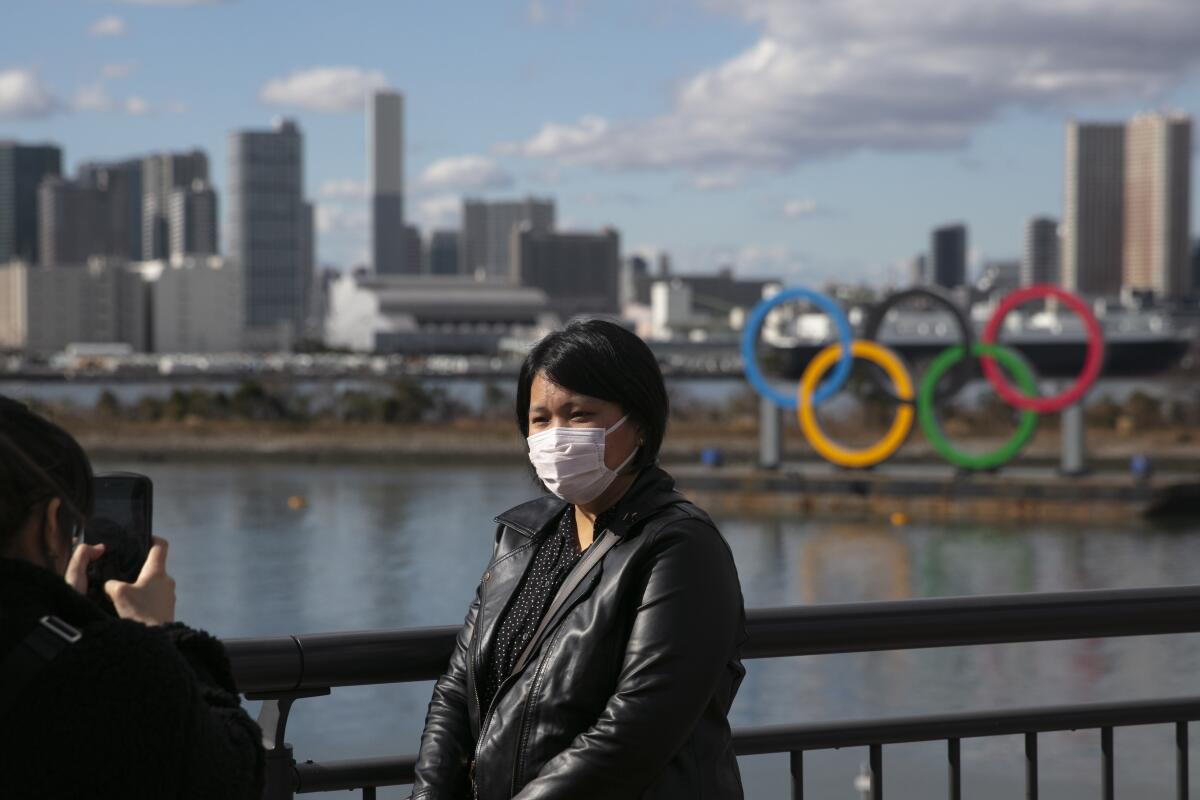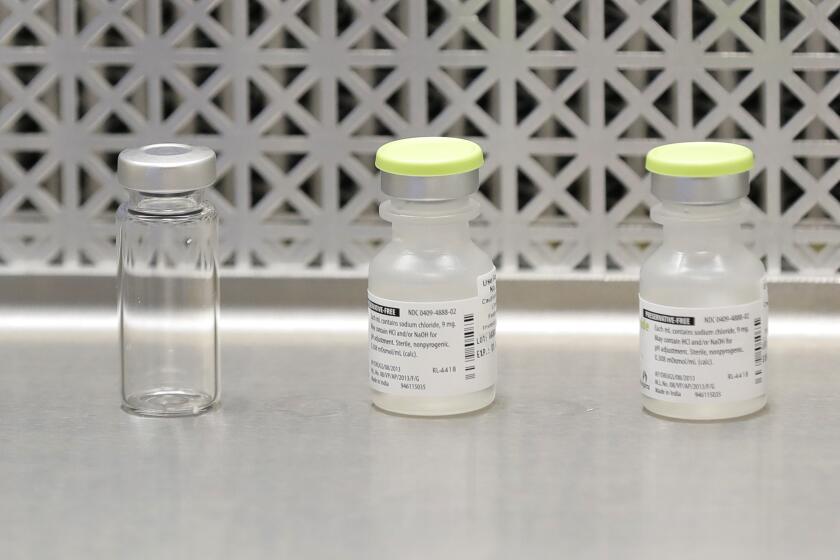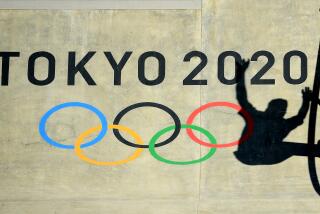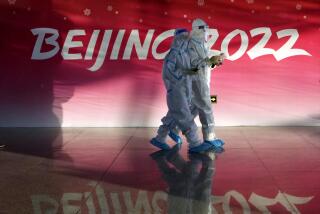Japan’s top doctor says Tokyo Olympics would be difficult without vaccine

- Share via
TOKYO — The medical community in Japan is moving toward a consensus that holding next year’s Tokyo Olympics may hinge on finding a coronavirus vaccine.
Japan Medical Assn. President Yoshitake Yokokura said in a video media conference on Tuesday that the Olympics were possible only if the infections were under control, not only in Japan, but globally.
“In my view, it would be difficult to hold the Olympics unless effective vaccines are developed,” Yokokura told reporters. “I hope vaccines and drugs will be developed as soon as possible.”
He did not say whether he opposed holding the Olympics without vaccines.
Japan has reported 13,576 COVID-19 cases, and 712 others from a cruise ship quarantined near Tokyo earlier this year. On Tuesday, the health ministry reported 389 total deaths from the virus.
Japan and the International Olympic Committee agreed to postpone the Tokyo Games until July 23, 2021, because of the pandemic. Japan is currently under a month-long state of emergency.
Full coverage of the International Olympic Committee’s decision to postpone the 2020 Tokyo Games until 2021 because of the coronavirus outbreak.
A Japanese professor of infectious disease said last week he was also skeptical the Olympics could open in 15 months.
“I am very pessimistic about holding the Olympic Games next summer unless you hold the Olympic Games in a totally different structure, such as no audience or a very limited participation,” said Kentaro Iwata, professor of infectious disease at Kobe University.
Yoshiro Mori, a former prime minister and now president of the organizing committee, told the newspaper Nikkan Sports there would be no more delays if the Games can’t be held in 2021.
“In that situation, it will be canceled,” he said. “In the past, when there were such problems, like wartime, it has been canceled. This time, we are fighting an invisible enemy.”
Mori added: “This is a gamble for mankind. If the world triumphs over the virus and we can hold the Olympics, then our Games will be so many times more valuable than any past Olympics.”
Devi Sridhar, a professor of global health at the University of Edinburgh, also said holding the Olympics may depend on finding a vaccine. This could apply as well to the 2022 Winter Olympics in China, the country where the coronavirus was first detected.
She said a vaccine was “optimistically 12 to 18 months away.”
CanSino Biologics of China is in the second phase of testing a coronavirus vaccine candidate, and a U.S. shot by Moderna and the NIH isn’t far behind.
“Science is just half the battle,” Sridhar said. “The other half is manufacturing enough doses and getting these into people across the world. How would prioritization be done?”
She asked who would get the vaccine first: health workers, those working with the vulnerable or the elderly, or the elderly themselves. Sridhar said it was unclear how young, strong Olympic athletes would “fit” into the “priority process.”
“I’m sure there is going to be some innovative thinking about how to combine safety of athletes, their coaches and teams, with the awareness that sports play a crucial role for the world — for economic reasons, but also socially,” she said.
Masa Takaya, a spokesman for the Tokyo Olympics, said he was aware of the comments from the head of the Japan Medical Assn.
“We understand there are a variety of insights, opinions around the possibility of hosting the games next year,” Takaya said. “Some medical experts are also expressing that it is too early to make a judgment.”
There will be a push from many quarters to hold the Olympics next year — vaccine or no vaccine, fans or no fans.
“This is placing tremendous pressure on all involved to devise an acceptable, rather than optimal solution,” David Carter, who teaches sports business at USC, said in an email to the AP. “Add to this the unwavering importance the IOC places on its brand, and the uncertainty in terms of public health, and you find yourself with international sports’ version of a Rubik’s cube.”
The International Olympic Committee depends on selling broadcast rights for 73% of its income. Another 18% is from sponsors. The IOC has only two major events to sell, and broadcasters don’t pay much of their fee until the Olympics are aired.
Japan has officially spent $12.6 billion to organize the Olympics, and a national audit office says the real figure is at last twice that large. Media estimates in Japan say the cost of the delay will be $2 billion to $6 billion.
Add to this 11,000 Olympic athletes, and 4,400 Paralympians. The vast majority get only one shot at the Games.
And then there are the sponsors.
Japanese organizers have signed up more than 60, and they have paid about $3.3 billion to be linked to the Olympics. The IOC also had 14 long-term sponsors such as Coca-Cola and semiconductor maker Intel, which are reported to pay about $100 million to be linked to the Olympics.
Tokyo has also sold millions of tickets. It’s unclear what will happen if the Olympics are held without fans. The tickets carry a force majeure clause, which may permit organizers to avoid refunds.
Tokyo organizers expected income of $800 million from ticket sales.
“The pandemic is changing sport worldwide,” said Doug Arnot, who has held senior staff or consulting positions with eight Olympic organizing committees.
The Los Angeles-based consultant worked with the Tokyo bid committee, but is no longer involved with Tokyo.
“It will probably have significant impacts on the way we organize events and the way we deliver them. This is not just about Tokyo,” Arnot said. “This is about about the world of mega-events. This virus has changed the way we look at these events. Sport wants to be a responsible member of the world community.”
More to Read
Go beyond the scoreboard
Get the latest on L.A.'s teams in the daily Sports Report newsletter.
You may occasionally receive promotional content from the Los Angeles Times.








